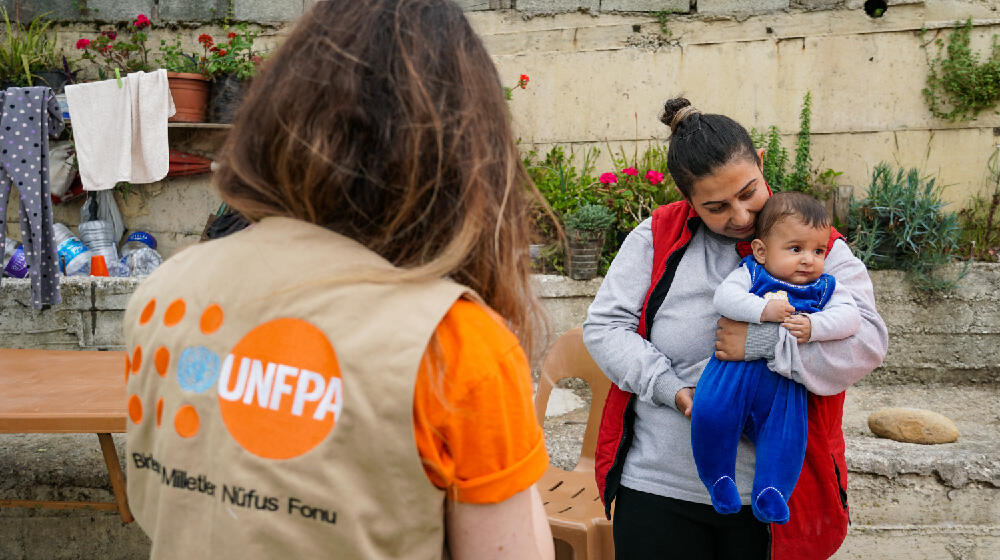The earthquakes on 6 February 2023 upended the lives of nearly 9 million people in Türkiye directly. Among them were some 130,000 pregnant women. Overall, 107,000 injuries and over 50,000 deaths had been reported as of the end of April. According to UNDP, as many as 70% of the survivors injured by the earthquake are expected to have a disability. Marking the third month after the devastating earthquakes, a number of challenges and needs remain to be addressed. The UN Population Fund, UNFPA Türkiye, has been on the ground with the support of its partners since day one.
6 May 2023 - Tens of thousands of people had to move to temporary shelters including makeshift tents on the street, and their family homes flattened in an instant – some 2.4 million are reported to be still living in displacement camps of whom 1,6 million are living in informal settlements and almost 800,000 in formal sites. Adverse weather conditions in the affected area are particularly impacting those living in informal sites and tents.
Population movements within the earthquake-affected area have caused the population to concentrate in some areas putting more pressure on front-line service providers. On the other hand, in the most affected provinces (like Hatay, Adiyaman, and Kahramanmaras), the population decreased by half in some cities.
In a humanitarian crisis, women and girls are still, always, the hardest hit as the last to eat, those who do not have access to the basic hygiene and healthcare supplies they need, and those most exposed to gender-based violence and exploitation. Thousands of buildings, including hospitals and UNFPA-supported facilities, were damaged and destroyed in the quakes, leaving many of the estimated 130,000 women who are pregnant across Türkiye, as well as breastfeeding mothers, struggling to access essential antenatal, delivery, and postnatal care. Hundreds and thousands of women and girls are still living in overcrowded informal settlements with little privacy – a lack of toilets and hygiene facilities is a constant source of distress.
Field observations indicate that most of the informal shelter settings (or areas) continue to lack protection and health services. The capacity of the service providers in delivering mobile services is below the needs of the affected population. Additional mobile facilities (like vehicles or tents/containers) and professional staff are needed to fill this gap.
Access to hygiene materials, lack of segregated toilets, and showers continue to be the main barriers for women and girls in managing their menstruation. Pregnant migrant women face barriers in accessing maternal health services. Reproductive health supplies, including life-saving maternal health medicines, as well as hygiene items such as sanitary pads, remain in short supply. Safe spaces and specialized services are needed in settlements for the promotion and support of breastfeeding.
At the same time, protection risks are massive and there have been reports that gender-based violence, exploitation, and abuse including child, early, and forced marriages have all increased. Services to prevent and respond to gender-based violence are overstretched or non-existent.
UNFPA has been coordinating with partners since day one to get reproductive health and protection services up and running again, increasing mobile teams and outreach to take maternal health and protection services to women and girls in need, wherever they are. We urgently need funding for more clinics, mobile health teams and safe spaces to reach every woman and girl in need.
UNFPA has been running global and national donation campaigns targeting individuals and private sector donors to support women and girls affected by the earthquake in Türkiye and the region. With additional funding, UNFPA will do whatever it takes to make sure that women and girls affected by the earthquakes in Turkiye can have healthy and safe lives free from violence.
Key Stats/UNFPA response in numbers:
- UNFPA has reached close to half a million people across Türkiye and Syria with reproductive health and protection services and life-saving kits since the earthquakes.
- UNFPA has distributed more than 18,000 Dignity Kits and Maternity Kits containing supplies for mothers and newborns across Türkiye.
- 8 UNFPA-supported static service units, 2 tent service units and 10 mobile outreach teams provide SRH and GBV services.
- Almost 28,000 people have received reproductive health and protection services over the last three months in Türkiye through UNFPA-service delivery points.
- 27 metric tons of reproductive health supplies were distributed to the Provincial Health Directorates in 10 affected provinces.
About UNFPA:
The United Nations Population Fund, UNFPA’s mission is to deliver a world where every pregnancy is wanted, every childbirth is safe and every young person’s potential is fulfilled. UNFPA calls for the realization of reproductive rights for all and supports access to a wide range of sexual and reproductive health services, including voluntary family planning, quality maternal health care and comprehensive sexuality education.


